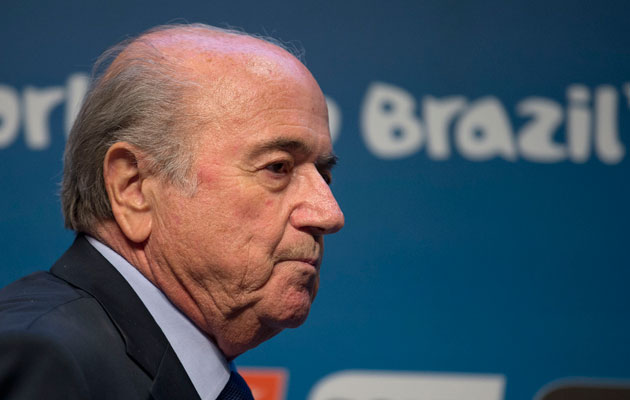Shameless is as shameless does and few more shameless than Sepp Blatter. To say he has now been economical with the truth is barely the half of it.
New revelations in the Sunday Times show that last Friday. At a meeting of the FIFA Executive Committee, several members angrily insisted that the results of the Michael Garcia inquiry into World Cup corruption by Qatar and Russia should be published rather than stay embargoed by the autocratic chief of the ethics committee Hans-Joachim Eckert. This, it should be said in parenthesis, though even and when the report is made known, it may prove something of a lame duck since Garcia is reported to have said that neither Russia or Qatar could ultimately be impugned.
An angry Garcia himself has, to give him his due, demanded that his report be published, and there is now a call for him to publish and be damned.
At the fiery exco meeting, a number of prominent figures including Michel Platini, at last doing something positive and proper as president of UEFA, insisted that the report be published, only to be opposed, all too predictably, by the suspect rump of the committee, comprising members who had cast their tarnished votes in favour of Russia and Qatar.
Blatter, reportedly and deplorably, tried to rule that only members of the tarnished committee which had cast those votes, should now be allowed to vote on whether the report be published – which almost takes the breath away at such blatant skulduggery.
Then one learns that Blatter tried to effect a shabby compromise whereby the report be published but redacted, in other words censored as a summary with Eckert empowered to conceal the names of suspects and witnesses. When this was angrily refused by the prosecutors, Blatter had the brass to insist that “most of the requests coming from the publication of this report were from the people not there on December 2, 2010, when the decision was taken for the 2018 and 2022 World Cups and today in the meeting there was not any longer any requests from any of these members in FIFA to publish his report.”
His nose by now must be longer than Pinocchio’s. How did he think he could ever get away with such a blatant falsehood? Answer, I wearily suppose, is that he, like Havelange, can get away with anything. Yet for how much longer?
Curious meeting on a train…coming away from the Crystal Palace-Leicester game last Saturday. One fell into conversation with a genial elderly couple who declared themselves loyal Portsmouth fans.
The husband mentioned that his wife’s grandfather had been a Pompey director. I asked what his name was. “Spriggins,” he said, which evoked a long buried memory. The scene was the Portsmouth FC boardroom before a Fratton Park home match, when Pompey were a leading First Division club, the year 1957.
I was covering the game for the Observer, a small group of us reporters were gathered, received by the then chairman – a role rotated there, season by season – by Guy Spriggins, a local dentist. At a certain moment in the conversation, the football correspondent of the local Portsmouth evening paper, a small rain coated man, vouchsafed an opinion. “Oh you,” said Spriggins, turning on him. “You’re nothing!” It was a shocking thing to say and I stared angrily at Spriggins. Quite apart from the gratuitous insult, the irony of it was that the local reporter’s influence was arguably far greater than any of ours, the so-called “nationals.” Spriggins descendant didn’t take the story amiss.
How encouraging to find at Crystal Palace that wingers emphatically live.
Palace now under their returning manager, Neil Warnock, demolished Leicester City, thanks chiefly to the pace, power and elusive ball control of Jason Puncheon on the right and an irrepressible Yannick Bolasie, on the left.
By contrast, Leicester played with no wingers at all. It had hardly troubled them a week earlier when they so dramatically thrashed Manchester United 5-3, but at Selhurst Park the contrast was extreme.
That dynamic late developer, 27-year-old Jamie Vardy who had tormented United, spent time on the left flank in the first half and the right flank in the second, but to little effect.
You might say that Vardy himself is an intriguing symbol of two encouraging aspects or counter aspects of football. First, that at a time when we are growing all to used to reading of young stars who joined their clubs almost in infancy from 10 to 12 years old (and what of those who joined and failed?) here is a player, now 27, who broke through only in his mid 20s. This, after rejection as a boy by his local club Sheffield Wednesday; rejected because (like World Cup winner Alan Ball at Bolton) he was too small.







